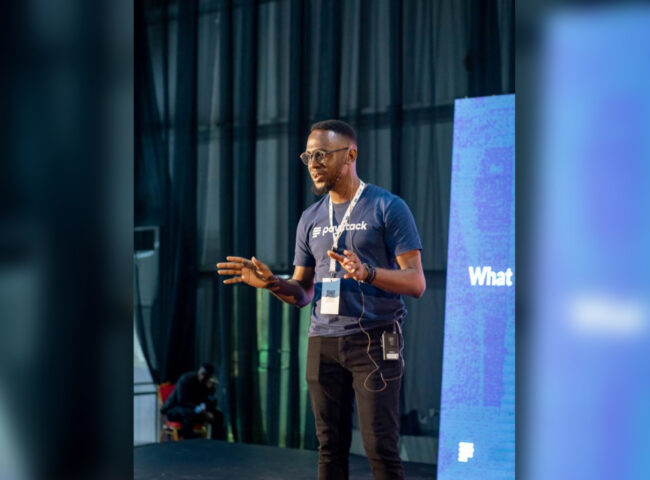Jesutofunmi Falade is a Senior Software Engineer with one of the foremost fintech companies in Nigeria. Despite his non-tech background, being an arts student and studying English Language, he has found his foot in the tech world. In this interview, he talks about how he became a Software Engineer, his experience so far, and how he is contributing his quota to the society.
You were an Arts student in secondary school and you studied English Language at the university, how did you find out about the tech world and what made you get into it?
I found out about the tech world or software engineering to be precise around 2011 or thereabouts. My elder cousins were software engineers but the one I am closer to was always writing codes at home on a windows desktop computer. He used to use Dreamweaver and I used to wonder what he was doing because they were all red and they looked like hacking. That was how I got interested in what he was doing and I asked him questions. He explained some things to me at the time but I could not really understand but it was fascinating and so, I looked forward to being able to do the things he was doing. Fast forward to 2012, I had access to my dad’s laptop and I started playing with different things on the laptop including Photoshop to manipulate pictures for fun. Then, I stumbled on Dreamweaver and I realized that this was the same application I saw my cousin running on his desktop computer. I played with it saw that it was bringing out things that looked like website and it got me more interested. Fast forward to 2013 when I resumed at the prestigious Obafemi Awolowo University (OAU), I was still trying to learn it but I had not gotten the opportunity to find a place to learn it. Luckily, a roommate of mine briefly mentioned it one day when we were talking that he knows how to write HTML and that was my first opportunity to learn how to write HTML. I learned a bit of it from him and ever since then, it has been an interesting journey for me.
How was the experience when you started? Would you say it was difficult, especially as a non-science student? Were there some terms and concepts you did not understand?
For me, because I started out of fascination, it was my drive. I was fascinated so I did not really see anything as difficult. I only saw them as I do not know this yet and I should know it. I think the fact that I was not even a science student was what was making them more fascinating to me because it was like I wanted to prove to myself that I could handle it. So, fascination and curiosity were my major drives so even when things seemed difficult to me, they were still interesting because I felt once I have conquered this, I have conquered it. But truly as time went on, there were some concepts that I did not know because I was not a science student. So, it meant I had to do extra work, I had to go back to online tutorials to try to learn things like bytes, binaries and the likes. I had to learn them afresh because I had not learned them before.
You have been in the tech world for some years now, you have even become a Senior Engineer. What do you think has helped you in these years? How have you been able to grow and add value to yourself and to those around you?
I think the drive for me which I said before, curiosity and fascination, have been my major growth catalyst because they always made me want to learn more things, because the more I conquer, the more I learn new things and the more I want to learn more. When I got into the field professionally and when I started doing it as a source of living, it was even more interesting because it meant I was doing what I love because I love writing codes. It was a great opportunity to enjoy my hobby while making ends meet. For what has kept me going, I will say I have been successful in it because I have been able to build complex applications for different industries and I have been able to have talks with those that studied this in school as a course and although, kudos to them, but I have never found myself wanting or brainstorming on ideas when we are having discussions. This has kept me going. Every time I get commended for applications I have built or for systems I have designed, they are my personal confirmation that I am on the right path, and every time I build things that I myself use and I love them, it keeps me going.
Adding value to myself has involved me learning new things like I said. For one, I do not see programming languages as things that should define a developer, I do not let them define me, I have always seen languages and other technologies as tools that should be learned depending on what needs to be done and because of this, I will call myself a polyglot in programming languages. I have been able to acquire different programming languages at different points in time, and acquire skills in different technologies because what I wanted to build at that time required those things: Python, PHP, JavaScript, and the likes.
In adding value to people around me, because I had the opportunity to demystify tech at a young age to myself, I have always loved to do the same for people. So, when I see budding engineers, people that are interested in tech, it is always a thing of joy to help them demystify it and I believe that has been my own way of giving back and adding value. I also love to mentor young engineers, and even children. I love to help people see that tech is not complex, it is not a mystery, and it is something they can also do.
These days, everywhere you turn, you hear the word ‘tech bro’ and ‘tech sis’, in fact, everyone wants to go into tech. What do you think is responsible for this tech rave right now?
I will say the emergence of technology in every sector. Every sector now has technology in it. Gone are the days when most of these sectors were conservative: the health sector was conservative and relied on manual paperwork, it had to manual because they had to be very careful; the legal world was also conservative, it had to be by physical paper. The world suddenly started moving away from it, the emergence of technology just kicked in and because of that, there was a high rave and high need for engineers to go into all these sectors and build different applications for them. This, in a way caused a boom in Silicon Valley in the United States where we started having lots of startups coming up and Venture Capitalists (VC’s) funding, and these people were able to start hiring locally and abroad. In Nigeria, why it became really big is that these companies were hiring Software Developers and that opened up the door of opportunities for Software Engineers locally and abroad. They could work for companies anywhere in the world, doing things they love and making money. This, I believe is what became responsible for the rave of tech bros and tech sis.
If you could advise anyone in the non-tech world that wants to delve into tech, what will you tell them?
I will them firstly not to get overwhelmed, there are lots of words and terms you will hear flying around and I want to promise you that you do not need to know everything and it is okay for you to start small. Fun fact is that when you want to learn any programming language, the first thing you will type out is ‘hello world’, and this is because the originators of this language themselves understand that the first thing you will want to do is see something and ‘hello world’ is like an “I’m here”. Always treat everything like an ‘hello world’. The first step is if you are learning programming language, Shell Script for instance, take baby steps, take things one step at a time. There are lots of materials out there, there are blogs, YouTube channels, all you are going to need to search for most times is what you want to learn, plus dummy. Dummy does not mean the person is a fool or something, it is just referring to a beginner and that is like the keyword. So, you can search for DevOps for dummy and you will see lots of tutorials online to guide you like you are a total amateur. Also, anything you are learning in the tech world, you need to practice. The tech world is not like your typical theoretical environment where you read things and just read them for knowledge sake. You need to read, you need to watch tutorials, whichever works for you, but most importantly, you need to practice them and like I said, take it one step at a time, so you do not overwhelm yourself. You cannot know everything at once. Take one thing you want to learn, focus on it and start from the beginner stage. The great thing with programming and the tech world in general is that once you crack the problem-solving leg which you can do with any language or field, be it cybersecurity or whatever, other skills will come to you easily when you learn them. You do not need to bother yourself about knowing everything at once. If it is frontend you want to learn, pick one language you want to learn and learn it deeply. You will see that by the time you want to pick up another tool, it will be easier for you.
Not everyone will be interested in coding, so what other tech roles can be explored?
If you want to delve into tech as a non-tech person, you do not have to be a code writer. There are different fields in the tech world. You can be a tech writer, you can be a product manager, a data analyst, tester, data architect, UI/UX (User Interface/User Experience) designer, and so on.






